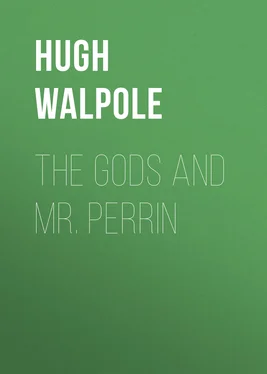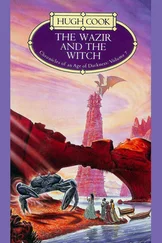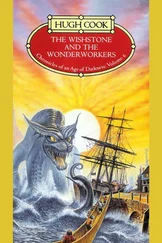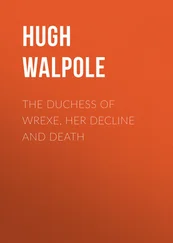Hugh Walpole - The Gods and Mr. Perrin
Здесь есть возможность читать онлайн «Hugh Walpole - The Gods and Mr. Perrin» — ознакомительный отрывок электронной книги совершенно бесплатно, а после прочтения отрывка купить полную версию. В некоторых случаях можно слушать аудио, скачать через торрент в формате fb2 и присутствует краткое содержание. Жанр: foreign_dramaturgy, foreign_antique, foreign_prose, на английском языке. Описание произведения, (предисловие) а так же отзывы посетителей доступны на портале библиотеки ЛибКат.
- Название:The Gods and Mr. Perrin
- Автор:
- Жанр:
- Год:неизвестен
- ISBN:нет данных
- Рейтинг книги:3 / 5. Голосов: 1
-
Избранное:Добавить в избранное
- Отзывы:
-
Ваша оценка:
- 60
- 1
- 2
- 3
- 4
- 5
The Gods and Mr. Perrin: краткое содержание, описание и аннотация
Предлагаем к чтению аннотацию, описание, краткое содержание или предисловие (зависит от того, что написал сам автор книги «The Gods and Mr. Perrin»). Если вы не нашли необходимую информацию о книге — напишите в комментариях, мы постараемся отыскать её.
The Gods and Mr. Perrin — читать онлайн ознакомительный отрывок
Ниже представлен текст книги, разбитый по страницам. Система сохранения места последней прочитанной страницы, позволяет с удобством читать онлайн бесплатно книгу «The Gods and Mr. Perrin», без необходимости каждый раз заново искать на чём Вы остановились. Поставьте закладку, и сможете в любой момент перейти на страницу, на которой закончили чтение.
Интервал:
Закладка:
In addition to Mrs. Comber, there was Cornwall; and Cornwall, as it was at Moffatt’s, was quite enough to draw Isabel unerringly, irresistibly.
Of the place—the surroundings, the look of it all, the “sense” of it—there is more to be said in a moment—being seen, more completely perhaps, with Traill’s new and unaccustomed eyes; it is enough here that, on every separate occasion of her coming, it meant to Isabel deeper and more vital experiences. She was beginning even to be afraid that it was not going to let her go again: its sea, its hard, black rocks, its golden gorge, its deep green lanes, its gray-roofed cottages that nestled in bowls and cups of color as no cottages nestle anywhere else in the world—these were all things that she dreamed of afterwards, when she had left them, to the extent, it began to seem to her, of danger and confusion.
She herself “fitted in” as only a few people out of the many that go there could ever do.
With her rather short brown hair that curled about her head, her straight eyes, her firm mouth, her vigorous, unerring movements, the swing of her arms as she walked, she seemed as though her strength and honesty might forbid her softer graces. To most people she was a delightful boy—splendidly healthy, direct, uncompromising, sometimes startling in her hatred of things and people, sometimes arrogant in her assured enthusiasms; Mrs. Comber, who, in her muddled eager way, had told her so much, knew of the other side of her, of her tenderness, her understanding.
The boys loved her, and she had been their envoy on many occasions of peril and disaster; they always trusted her to carry things through, and she generally did.
It was only, perhaps, with the other ladies of the establishment that she did not altogether find favor. The other ladies consisted of Mrs. Moy-Thompson, Mrs. Dormer, and the lady matrons—Miss Bonhurst, the two Misses Madder, and Miss Tremans.
Mrs. Moy-Thompson, a thin, faded lady in perpetual black, had long ago been crushed into a miserable negligibility by her masterful husband. She very seldom spoke at all and, when she did, hurriedly corrected what she had just said in a sudden fear lest she should be misunderstood. She allowed her husband to bully her to his heart’s content.
Mrs. Dormer, stern, with the manner of one who never says what she means, had never got over the disappointment of her husband having, fifteen years before, missed the head-mastership. She was continually finding new reasons for this omission and venting her dislike on people who had had nothing whatever to do with it. She was neat and puritanical, and hated Mrs. Comber because she was neither of these things.
Of the matrons, it may be enough to say that they all disliked each other, but were perfectly ready to combine in their mutual dislike of the other ladies; they felt that their position demanded that they should assert their birth and breeding; they also felt that Mrs. Comber and Mrs. Dormer looked down on them.
The best of them was the matron of the Lower School, the elder Miss Madder—stout and kind-hearted and extremely capable. She made up for the undeniable fact that no one had ever asked her to change her name for a pleasanter one by loving the small boys of the Lower School with a warmth and good-humor that they none of them, in after life, forgot.
And so there they all were—most of them—a background, and simply, as individuals, witnesses to the whole case and, perhaps, by reason of their very existence, factors in assisting the result.
They were, most of them, never in young Traill’s consciousness at all—Miss Madder, perhaps because she was at the Lower School; Mrs. Comber, because Isabel was staying with her… and Isabel.
A word, finally, about the surrounding country.
It becomes, perhaps, at once most definitely presented if you take the Brown Hill as the center, and Pendragon to the right along the coast, and Truro inland to the left—both at an equal distance—as the farthest boundaries.
Between Truro and Moffatt’s there is a ridge of hill—undulating, gently, vaguely shaped, with its cool brown colors melting into the blue or gray of the sky as dim clouds melt into one another.
The Brown Hill itself rises sharply, steeply, straight from the sea, with the little village—Chattock—at its feet, curling with its steep, cobbled street up the incline. Halfway down the hill there is a wood—the Brown Wood—and it hangs with all its feathery trees in friendly, eager fashion over the little white-stoned and yellow-sanded cove (so tiny and so perfect in its shape and color that it almost audibly cries out not to be touched). There is a little part of the wood where the trees part and you may sit, in a kind of magical wonder, right over the gray carpet of the sea, hearing what the wood, with its creaking and bending and rustling, is saying to the water and what the water, with its slipping and hissing and singing, is saying to the wood. Of the two towns Pendragon has become, from the invasion of the Vandals, modern and monotonous. It had, not so long ago, a cove on its outskirts—that was the whole of Cornwall in a tiny space; now there is a row of modern villas, red-roofed and wooden-paled. Traill, in his visits there, was concerned with the chief house there—The Flutes, owned by a certain Sir Henry Trojan, whose son, Robin Trojan, had been, although senior, a friend at Cambridge. The house was beautiful both in its position and in the spirit of its owner, and Traill snatched what moments he could to visit it and to snatch a respite there.
Had he known, it became in the back of his mind a contrast with the “lobster red” and the stone corridors of Moffatt’s, so that he took its wide, high rooms and its shining, ordered garden with an added sense of richness. Had he realized how soon its dignity and peace stood to him for an “escape,” he would have realized also his growing protest against his voluntary imprisonment. He went over also on occasions to Truro—because he liked the walk over the hill, because he liked certain quaintnesses in the market, in the sharp cobbles of Lemon Street, in the higher breezes of Kenwyn, because, above all, he liked the dark quiet and solemnity of the Cathedral.
The point about both Pendragon and Truro is that it was the kind of life that he was leading at Moffatt’s—the sides of it that are soon to be given you in detail—that led him to notice these places. Contrast drove him to a sudden opening of his eyes—contrast and Isabel Desart. He was growing so very quickly.
In letters to his mother he spoke of a splendid little wood where one could sit and watch the sea for hours if there was only time; of the funny old hill, all brown, with the white road curling up it; of calling at The Flutes, and “Sir Henry Trojan and Lady Trojan being most awfully kind,” and the house being quite beautiful, but very little about the people of the school, and during those first few weeks nothing at all about Isabel Desart.
It was not until Mrs. Comber gave her dinner-party that the preliminaries could be said to be over.
CHAPTER III—CONCERNS ALL THE WONDERFUL THINGS THAT MAY HAPPEN BETWEEN SOUP AND DESSERT
WHEN Mrs. Comber asked Vincent Perrin to her dinner-party he was delighted, although he assumed as great an indifference as possible. This was at the end of the first week of term, and he had not spoken to Miss Desart—he had merely bowed to her across the grass and gone indoors to teach the Lower Third algebra with a beating heart.
He was also fortunately prevented from seeing that Mrs. Comber was giving the dinner for Traill. If he had seen that, things might have been very different; as it was, he thought that that kind, good-natured woman (he did not always like her) had noticed his attachment—as he thought most carefully concealed—to Miss Desart and wanted to help him.
Читать дальшеИнтервал:
Закладка:
Похожие книги на «The Gods and Mr. Perrin»
Представляем Вашему вниманию похожие книги на «The Gods and Mr. Perrin» списком для выбора. Мы отобрали схожую по названию и смыслу литературу в надежде предоставить читателям больше вариантов отыскать новые, интересные, ещё непрочитанные произведения.
Обсуждение, отзывы о книге «The Gods and Mr. Perrin» и просто собственные мнения читателей. Оставьте ваши комментарии, напишите, что Вы думаете о произведении, его смысле или главных героях. Укажите что конкретно понравилось, а что нет, и почему Вы так считаете.











